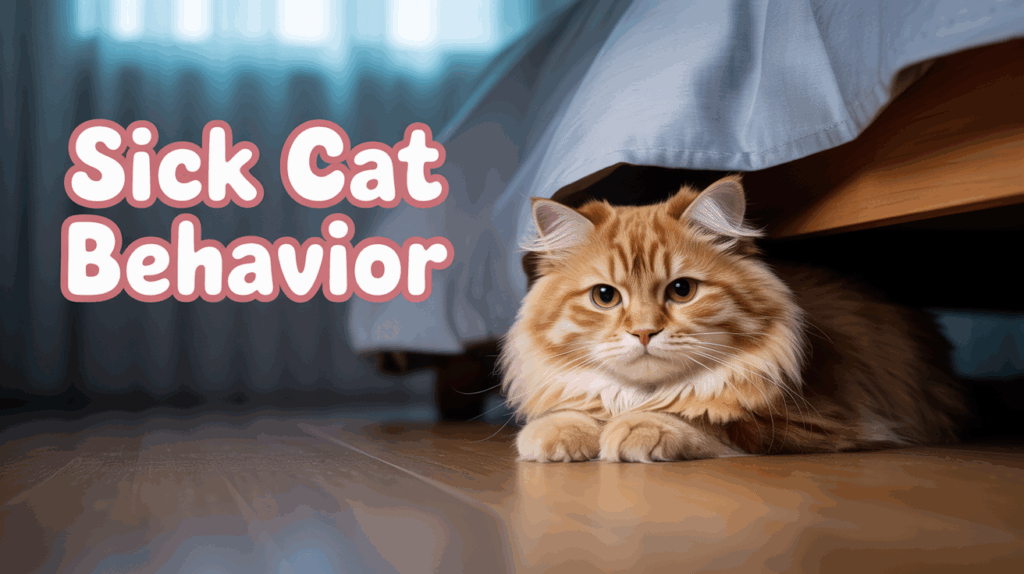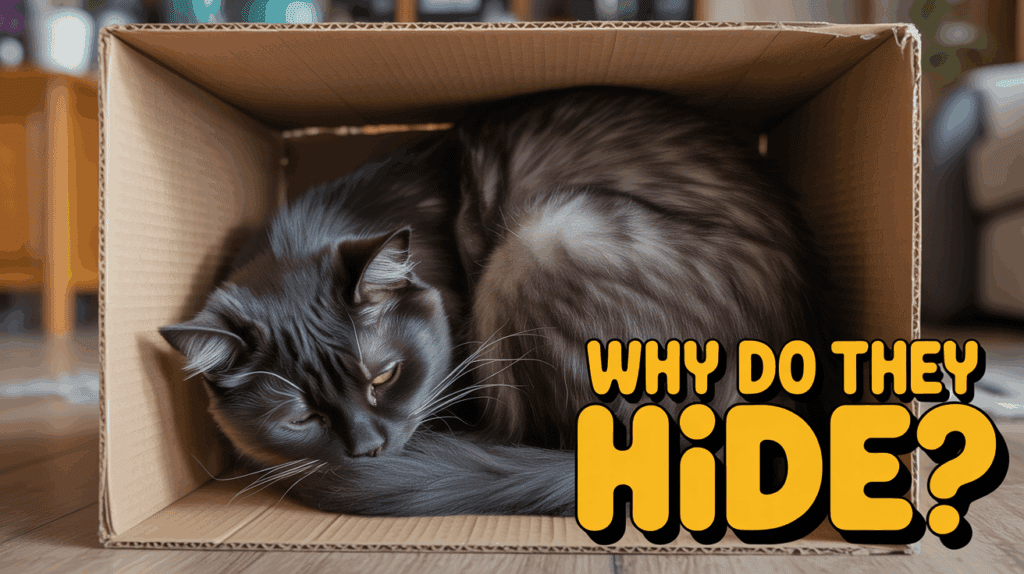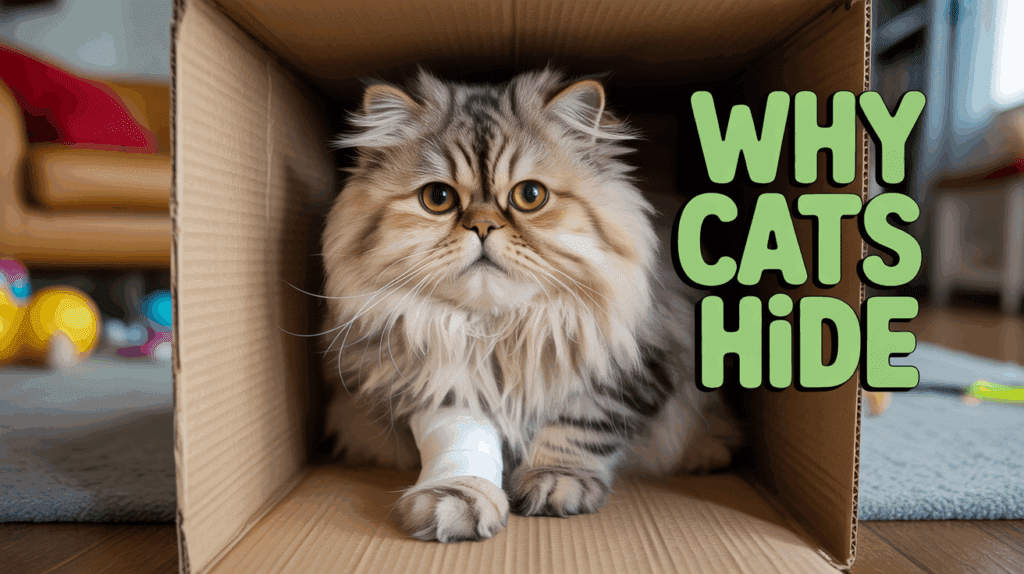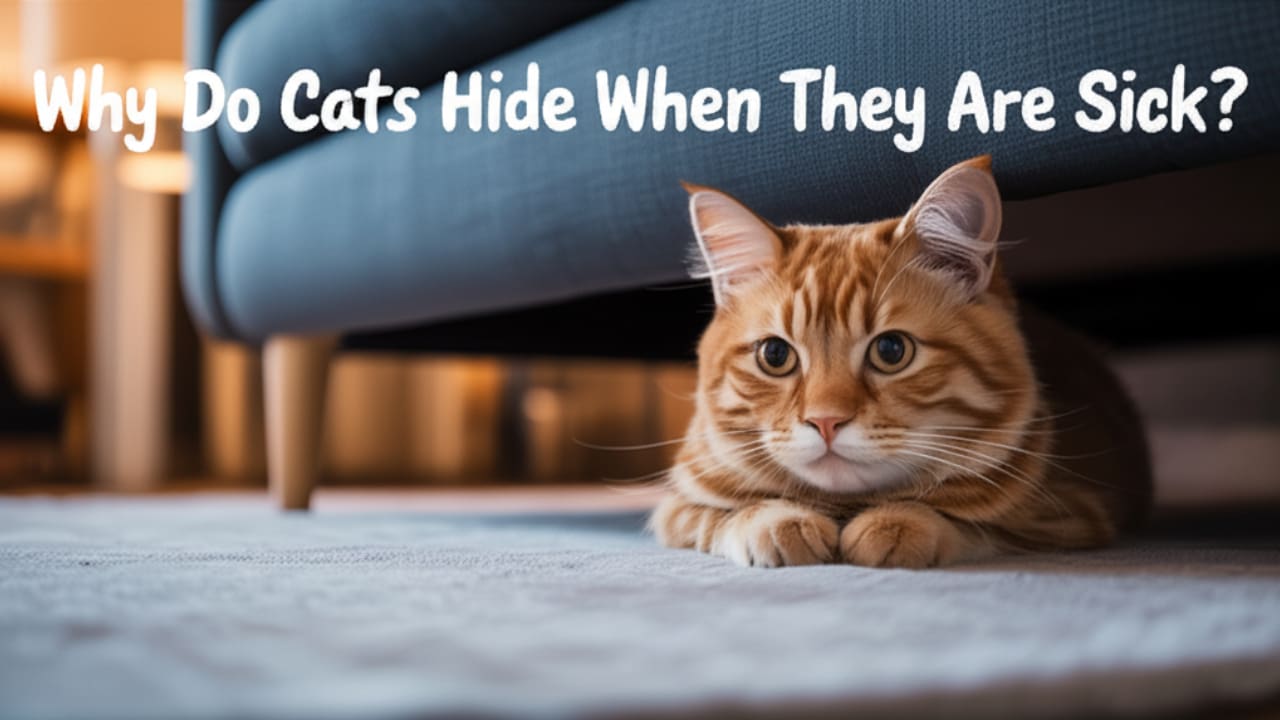Why Do Cats Hide When They Are Sick? (2025 Vet Guide): Instincts, Symptoms, Pain Signs, and When to Call the Vet
They’re sick or in pain, but they are nowhere in sight. Your cat is probably hiding somewhere under the bed or in tight corners, refusing to come out. And you are worried. Of course you are.
Whenever this happens, it just gets you wondering. Why do cats hide when they are sick?
Our little ones are probably just following their instinct. It’s like an automatic protective reminder telling them to find a place that’s safe and stay hidden from prey when they’re vulnerable. In short, it’s survival behavior.
It’s not something we always need to interfere with. But, we pet parents should know when to leave them alone and when to take action.
First, learn to tell the difference between normal resting behavior and hiding because of illness. Do they refuse food? Are they hiding for more than 24 hours? Are they hiding in places they don’t usually hang out in? There are evolutionary reasons behind this behavior.
Then, we can move on to taking action, and you’ll learn how to do so here. But in essence, we should always support our hiding cat without causing more stress. And sometimes, it’s best to just contact your vet and let them help.
Why Do Cats Hide When They Are Sick or Hurt?

Your cat is likely to hide when they’re sick, in pain, or injured. This is quite normal, actually. They are hiding, not exactly from you, but due to their signs of weakness. It’s a behavior deeply rooted in their instincts.
In the wild, vulnerability means “You’re food” to animals. And your cat is no stranger to that instinctual echo. Hiding, then, becomes a survival mechanism.
Even if your cat is living in the house with you now, they still often revert to this instinct. That’s why you sometimes see your baby hiding in quiet spaces. For example, you may find them slipping under your bed, into your closet, or behind furniture. They are not aloof or stubborn. They’re just protecting themselves.
That said, your furball may not be hiding just because of illness. It could be emotional stress, anxiety, or something like sudden environmental changes. And hiding from these things is second nature to your cat.
Monitor closely and see if there are other signs that you notice, like appetite loss, lethargy, or vocal changes. It might help your vet to diagnose or treat your cat (if it’s necessary, of course).
| How Long Hiding Lasts | Is It Normal? | What You Should Do |
| Less than 12 hours | Yes | Just keep an eye on them |
| 12 to 24 hours | Maybe | Look for signs of pain or illness |
| More than 24 hours | No | Book a vet appointment right away |
| Over 48 hours and not drinking water | Not Safe | Go to an emergency vet immediately |
Why Do Cats Hide When They’re Sick? The Evolutionary Instinct

So, why do cats hide when they don’t feel good? Our feline friends have evolved with strong instincts to do so for their survival in the wild.
Felines are both predators and prey. They need to cover their weakness to avoid giving off signals like “I’m an easy target” to other larger animals. Illness, pain, or discomfort shows all these signs. So, the best way to hide them (the signs) is to hide themselves. It’s also a way to buy them time for recovery.
Your house cat is the same. They hide, not always because they’re being distant or antisocial. Even without the danger, your baby can’t really fight that instinct to disappear from sight if something’s wrong with them.
But their hiding doesn’t always mean physical illness or health changes. Other “smaller” things may set off their instinct, too. It could be the stressful environments, unfamiliar guests, or loud noises. These may tell your cat it’s time to bounce.
Learn to read your cat’s hiding behavior. Sometimes, it could be just shyness or moodiness.
Why Do Cats Hide When They Are Sick? How to Tell If They Are Actually Ill?

Our cats are masters at masking their illness. And that means we have to pay close attention and find out why they’re hiding.
It’s normal for your cat to want solitude from time to time. But if they suddenly want to hide more than usual, then you’ll need to take note.
This is especially the case if your cat starts hiding in unusual places or corners. And it’s even more so if you see a change in their appetite, energy levels, grooming habits, or vocalization.
Other signs of illness include refusing to come out of hiding for food, litter box avoidance, or simply just staying at isolated, hard-to-reach spots they don’t usually hang out in.
Know that health conditions such as infections, kidney disease, or gastrointestinal issues often make your cat feel very uncomfortable and vulnerable. And that leads them to hide, conserve energy, and avoid attention.
Why Do Cats Hide When They Are Sick? And How Long Will They Hide for?
You may wonder when your cat will come out again to cuddle. That really depends on the severity of the illness, your cat’s personality, and their environment.
It could be just a few hours, like a short rest to recover. For some, it could take a full day or longer. And if the condition is serious, your cat may just hide for days without even coming out for food or interaction. This could be due to an injury or progressing illness.
Temporary hiding is a natural response. But if your cat is hiding for a long period of time and showing signs of appetite loss or lethargy, know that there’s probably a deeper issue.
See if your cat is hiding for more than 24 to 48 hours. Are there other symptoms that come with the behavior? What’s different about them other than just hiding? Dig deeper.
Sometimes, it’s just normal self-care for your cat. But if you notice something unusual, monitor and call your vet. Trust your instinct, too.
Should I Let My Cat Hide When They Are Sick or Try to Intervene?
You may wonder if you should let your cat hide when they’re sick. After all, it’s their natural instinct. Well, that depends on the condition and the context of the behavior.
It’s actually okay, in many cases, to just give your cat some space to rest and feel secure. And that should be the case for very mild illness or when they’re recovering from a stressful event, like a fight with other cats, maybe. Hiding, then, helps reduce that stress level.
But know that you should do something if your cat is hiding for an unusually long time. And you should especially act if they show signs like refusing food, not drinking water, or avoiding the litter box.
Your cat may hide when they’re sick, and sometimes when they’re dying (but don’t just jump to this conclusion). So please observe and monitor closely.
Check if your cat is hiding for more than 24-48 hours. See if their behavior shifts drastically. If they do, it’s time for you to act.
Why Do Cats Hide When They Are Sick or Dying? Debunking Common Misconceptions
Some pet parents think that their cat’s hiding is a sure sign of dying. This is a common misconception.
It’s true that cats do hide when they are sick or nearing the end of their lives. But the behavior itself doesn’t point directly to that end.
There are many reasons to consider when your cat starts hiding. It could be just minor illnesses, injuries, emotional stress, or maybe even simple fatigue. Your little one may just want to rest. Maybe they want to avoid stimulation and just want to feel safe. It’s largely instinctual: lack of comfort equals hiding.
It’ll only become a possible problem if your cat stays hidden for a long time. In such cases, check for signs like appetite loss, weight changes, or abnormal bathroom habits. Monitor and ask for help if necessary.
So, don’t panic or scare yourself when your cat starts hiding. Calmly assess the situation. When in doubt, talk to your vet and do a checkup.
MYTH: “Cats hide to die alone”
FACT: Properly managed pain prompts most cats to seek out their trusted caregivers for comfort and reassurance (2022 ISFM Consensus Guidelines on the Management of Acute Pain in Cats).
Why Do Cats Hide When They Are Sick: Supporting a Cat That’s Hiding Due to Illness or Injury
You are one sweet pet parent to want to support your cat (and we want you to know that). Of course, you can’t leave your baby alone. There’s no way you can sleep well knowing that your little guy is sick or hurt, and in hiding.
That said, you should approach this with calm and patient care. Make sure that there’s enough food, water, and a clean litter box. Remember to place them in a place that’s easily accessible and near them (especially the litter box).
Never try to drag your cat out or force interaction. You really don’t want to cause more stress, and it might even make the situation worse.
Instead, talk to them gently, offer some treats, and sit quietly to let your cat know you’re there. Let them know you’re around as a source of comfort, not a threat.
However, if you think your cat’s been hurting for longer than a day or two, call your vet. Be sure to prioritize your cat’s health issues over your respect for their boundaries. Just try not to panic.
Observe warning signs. See if your cat is losing their appetite or disinterested in their surroundings, among others. Take action if the symptoms persist.
Why Do Cats Hide When They Are Ill: Are They in Pain vs. Just Scared?
So, do cats hide when they feel sick? Why do cats hide when they feel bad? These are all valid questions.
Our cats will often hide if they’re in pain. But they may also do so when they’re simply scared or stressed out. Pay attention to some subtle behavioral differences.
If your cat is hiding because of pain, they’ll likely remain in the same position for quite some time. They probably won’t move much or move very slowly. They may also avoid food or water and not allow you to touch them. Posture-wise, they may look tense or hunched, and they may vocalize or growl if someone approaches.
On the other hand, if your cat is hiding out of fear, it’ll be temporary. Once the “threat” (maybe loud noises, a new guest, or a recent vet visit) has passed, they’ll go back to normal. Give your cat a few hours and see.
In short, monitor your cat’s behavior. Observe their response to food and interaction. If the hiding is related to pain, then it’s more persistent. Otherwise, it’ll most likely be a rather short-lived tendency.
Why Do Cats Hide When They Are Sick: When to Contact a Vet If Your Cat Is Hiding
Hiding is quite a normal feline behavior. But you’ll need to seek help if it becomes a problem or is a sign of a problem.
If your cat has been hiding for more than 24-48 hours, especially without eating, drinking, or using the litter box, call your vet. It’s likely to have something to do with illness or injury.
Our cats don’t often hide just to feel good. It’s more of an instinct to mask symptoms. And some of these symptoms might require medical attention.
Also, watch for things like rapid breathing, drooling, vocal distress, vomiting, or sudden weight loss. If something seems off, the chances are, something is off.
If you’re not sure what to do, always call your vet. They can help you catch underlying conditions and guide you to take appropriate action.
What Your Vet Will Ask (Be Ready to Answer):
- When did the hiding start? What was the last time your cat acted normal?
Be ready to share the time you first noticed the change. Tell the vet what their behavior was like before that. - Water intake in the past 24 hours:
Try to estimate how much your cat has been drinking. Has it been more, less, or the same as usual? - Litter box changes:
Have you seen any differences in how often your cat pees or poops? What’s the amount, and how does it look (e.g. color or texture)? - Sounds your cat is making:
Has your cat gone quiet, started meowing differently, yowling, or growling when someone gets close?
Comfort Through Treats: Supporting Recovery with Gentle Indulgence
It’s not exactly a great idea to force our cat out of hiding when they’re stressed or feeling uncomfortable. And we understand that it’s hard for pet parents such as yourself to ignore them.
One thing you can do in this situation is to give them quiet reassurance through food and treats. This can sometimes help ease your cat’s experience. And it can also be a good way to encourage interest in food and strengthen the bond between you two.
You may use a small treat to coax them out of hiding, or simply let your little one know that you’re close by and available. We like Dr. Elsey’s Protein Bites for moments like this.
Dr. Elsey’s Pork Protein Bites and Turkey Protein Bites are crunchy, vet-formulated treats. They contain high-quality proteins, with added plasma and omega-3 fatty acids, meaning they help support your cat’s immune system and overall wellness. They are also free from grains, fillers, artificial preservatives, and genetically modified ingredients.
The Pork Protein Bites use hydrolyzed pork as the first ingredient, so it may be gentler on a sensitive stomach. The Turkey Protein Bites, on the other hand, use real turkey as the main ingredient. They are rich in flavor, and the lean protein may help support your cat’s nutritional needs during recovery.
As for the company, Dr. Elsey’s focuses on developing science-backed products to help cats live healthier. Dr. Elsey’s was founded by a feline veterinarian and his wife. Their mission is to create solutions to real challenges with pets, including illness, stress, and behavioral changes.
FAQs About Cats Hiding When Sick
1. How do you tell if a cat is nearing the end of its life?
Check if your cat is lethargic, losing appetite, hiding for a long time, and not breathing normally. And see if they just want to withdraw in general. If you find such behaviors, do not hesitate and call your vet.
2. How to get a cat out of hiding when sick?
Speak softly to them and put some of their favorite treats nearby. Do not force your baby out. Place some food, water, and a litter box somewhere close to reduce stress. And if your cat doesn’t come out after 24–48 hours, talk to your vet.
3. Do cats hide when they are in pain?
Yes, many cats hide when they’re in pain. It’s their natural response to discomfort. And it’s one way your cats protect themselves when they feel vulnerable.
4. How do cats show if they’re in pain?
Look for signs like limping, changes in grooming, and reduced appetite. See if they are vocalizing more than usual, not wanting to move, and if they’re choosing isolated hiding spots.
5. How to tell if a cat is in pain from kidney failure?
Pay attention to signs like weight loss, vomiting, bad breath, frequent urination, lethargy, and if they are hiding. You should arrange for veterinary testing if you find these symptoms.
6. Why do cats hide when they don’t feel well?
Your cats hide when they don’t feel good. It’s a survival instinct. It helps them avoid threats and save energy during illness or stress.
7. Can hiding behavior mean my cat has a chronic illness?
Yes. Cats with chronic conditions like arthritis, diabetes, or kidney disease may hide more often. They do it to manage discomfort or fatigue. But if the behavior is persistent, talk to your vet.
8. Is hiding a sign of emotional distress in cats?
It can be. Cats often hide because of anxiety, loud noises, changes in routine, or new people or pets in the house. But if there are no emotional triggers, maybe it’s a medical cause.
9. How long is it normal for a sick cat to stay hidden?
Typically, a few hours may be normal for mild illness. But if your cat is hiding for more than 24–48 hours (especially without eating, drinking, or using the litter box), get help. It might be something serious.
10. Can I train my cat to seek help instead of hiding?
It’s their instinct to hide. But you can build trust, offer calm reassurance, and create a safe, open space for your cat. It’ll likely help them feel comfortable enough to stay visible even when they’re sick.
Why Do Cats Hide When They Are Sick: Navigating This Behavior
Why do cats hide when they are hurt? Why do cats hide being sick? These are some of the questions we started out with at the beginning of this article.
As a pet parent, it’s important that you learn to read your cat’s behavior. Know what their hiding means. While it may not always be something serious, sometimes the silence is signal enough for your help.
Remember, your cat’s hiding may be a way of coping with pain, illness, or emotional stress. So observe carefully.
Look for changes in their hiding patterns, appetite, or responsiveness. Spot the early warning signs and take action before a condition gets worse.
Now, with the confidence of being equipped with such knowledge, support your cat’s health. But also, remember to respect their instinctual needs.
Trust your intuition and stay observant. And don’t hesitate to ask your vet for help when something feels off. Your cat is lucky to have you as a pet parent.
Has your cat ever hidden from you before? Where did they go? Were they sick? Let us know in the comments below.


